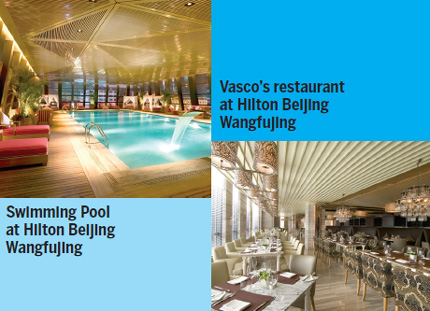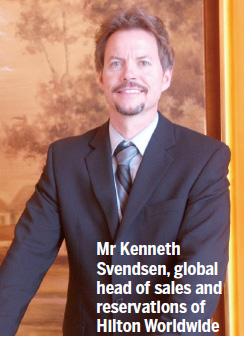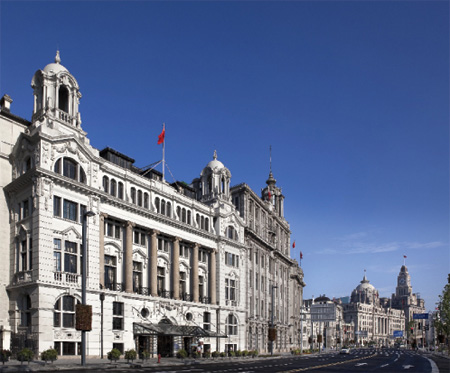Top notch in China
( HK Edition )
Updated: 2011-05-06
|
Waldorf Astoria Shanghai on the Bund |
"Take me to the Hilton" could well become the stock phrase among the burgeoning middle class in the Chinese mainland as the globally renowned brand is setting out on an eyepopping expansion spree.
One of the finest global brands in the hospitality industry, the Hilton Worldwide, is revving up its business expansion in the Chinese mainland, with two international top notch luxury brands - Waldorf Astoria and Conrad - launching their hotels in the most coveted stretches of real estate in China.
Waldorf Astoria Shanghai on the Bund opened the Waldorf Astoria Club, featuring 20 luxurious suites in the hotel's century-old heritage building, in August last year. The new Waldorf Astoria Tower building, with an additional 252 well-appointed rooms and suites, was inaugurated on April 18, completing the timeless luxury and legendary heritage of Waldorf Astoria Shanghai on the Bund
The Conrad Hotels & Resorts brand also made its debut just off the Chinese mainland, setting up shop in Sanya in Hainan. The island province, known as the "Hawaii of China" with such natural settings as palm trees, fine sand, pollution-free air, indigo seawater and immense space, makes for a perfect holiday resort. Conrad Sanya Haitang Bay's 101 resort villas offer immaculately luxurious experience for both Chinese and international tourists alike.
Additionally, Hilton Worldwide, which operates ten hotel brands around the world in 82 countries, has more than 70 hotels under various stages of development across China. That will greatly boost its presence in the country from the current 17 hotels. The swift expansion will pose stiff competition to other players in the industry.
"Hilton Worldwide - at least six of our brands - are very committed to expand in this part of the world, because we see tremendous growth trajectory and strong financial performance in this country," said Mr Kenneth Svendsen, the US headquartered hotel group's global head of sales and reservations.
"With our present pace of growth, we know that within a few years China will become Hilton Worldwide's second largest market," he said.
Hilton Worldwide's plan is well grounded. About 13,500 sets of interviews were done with their hotel guests, corporate clients, general managers and team members all over the world. But more crucially, a learning culture has been fostered to ensure the personnel understand the market thoroughly in order to give them the capability to deliver relevant services to the guests as they explore the Chinese market.
Hilton values the relationship with partners and intermediaries such as tour operators and travel agencies. On one hand, they provide deep insights in conducting business on the Chinese mainland; on the other, it has to be ensured that the intermediaries clearly articulate to guests and clients what the brands have to offer.
In this process, Hong Kong has a vital role being a vibrant city where the hospitality industry grows maturely and functions as a gateway to the Chinese market. It has been serving as "an incubator" where the hotel learns about China in general, and has managed to adapt the product and service offerings to guests hailing from the Chinese mainland.
"Top notch service, attention to detail, pre-eminent brands, innovative food and beverage concepts, these are the key elements we have learned behind our growth in China," said Mr Svendsen.
He explained that as a large number of Chinese people have become affluent, they have started to value the experience of luxury lifestyle and expect flawless service. This may not sound novel, but Mr Svendsen has noticed that "a broader part of the Chinese like to feel that they get 'a good deal' - a good deal which does not mean discount, but 'great value for money'."
And to achieve this level of quality, the hotel group has held many brand conferences and leadership meetings. It has also been moving the executives around the world so that top talents have the exposure to corporate senior leadership and to make sure that the general managers fully understand the strategic value of the aspiration to growth as well as where the company is going.
For instance, in the food and beverage section, they have come to understand that private dining rooms, while not uncommon in other markets, are particularly important in this part of the world.
"In China, the hotels remain a destination to entertain friends, and have their meetings, weddings, family dinners, company dinners and so on. So we really want to capitalize on this trend, and continue to be ahead of the game, be ahead of the market trends," said Philippe Garnier, vice president at the hotel group's Asia Pacific headquarters in charge of sales and regional marketing.
The process of exploring an unfamiliar market is not just about learning the culture, or for a prestigious global company, bringing great concepts and ideas that have been learned in the past to the new market. Hilton Worldwide fosters a culture that attaches value to great ideas originating anywhere in the world, said Mr Svendsen.
"Our mantra is to be globally consistent and locally relevant," said Mr Svendsen.
China Daily



(HK Edition 05/06/2011 page8)

